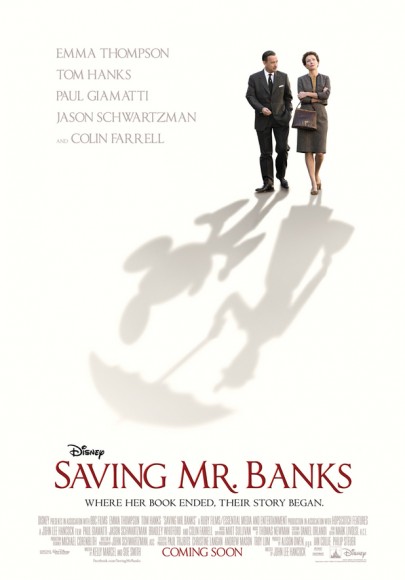Saving Mr. Banks
 Saving Mr. Banks Directed by: John Lee Hancock Cast: Emma Thompson, Tom Hanks, BJ Novak, Jason Schwartzman, Paul Giamatti Running Time: 2 hrs 5 mins Rating: PG Release Date: December 13, 2013 (Chicago)
Saving Mr. Banks Directed by: John Lee Hancock Cast: Emma Thompson, Tom Hanks, BJ Novak, Jason Schwartzman, Paul Giamatti Running Time: 2 hrs 5 mins Rating: PG Release Date: December 13, 2013 (Chicago)
PLOT: "Mary Poppins" author P.L. Travers (Thompson) has some reservations about Walt Disney's (Hanks) adaptation of her story.
WHO'S IT FOR? Fans of Disney, specifically those who are in their secret D23 club.
OVERALL
Disney's Saving Mr. Banks is engineered to capture the experience of watching a story that is supplanted with the copyrighted "Magic of Disney," from humanizing a king and showing him as socially accessible in his own castle, to the usage of music (granted, from another musical) as its spiritual force. In this way, Saving Mr. Banks parallels last month's Disney project Frozen, especially with the immediate similarities of icy women learning to warm up due to accepting the social embracing of others. But, while Frozen may be a disposable fairy tale with a suicidal snowman shoehorned into it, it at least doesn't brandish its moral tale as Saving Mr. Banks does, where dialogue seems like future Disney store bumper stickers, or products under the Disney brand are constantly in focus to remind one about the specific environment that is trying to pass along such a usually universal message.
Herself playing the anti-Mary Poppins, despite her comparatively foreign demur to those of which she interacts, Emma Thompson represents a dream Disney convert, one whose background represents that learning to stop worrying and loving the Mouse is not a matter of class, social background, or even age. As the writer who yearned to keep the reality within her story which was later adapted with Dick Van Dyke dancing with animated penguins, she does show aching discomfort in some moments, without the book-ending of flashbacks that fill in space with the literal. In a film that is solely about a woman deciding to finally drink the Kool-Aid, Thompson nonetheless provides a complicated portrayal of cynicism.
Hanks' version of Disney is that high of pure, uncut Hanks, that unmistakable charisma that cements him as one of our greatest movie stars today, and the one who marks him as salesman with a near magical allure. His time on-screen, even in such a disagreeable project, is warming. But the character he plays is disturbing with how much he is protected, as if Saving Mr. Banks were a visit into a king's personal life, masquerading as an all-access pass, but with Last Emperor-like over-protection that keeps from being recognized as a real person. In this regard, Saving Mr. Banks makes one of its more grotesque claims to choose fantasy over reality.
BJ Novak, who by potentially not-so-strange coincidence is also in The Internship, plays opposite Jason Schwartzman as Robert & Richard Sherman, the composing sidekicks in this tale. Trying to bring upbeat musical moments into the scarring tragedy of Travers' life, they are both doe-eyed and completely inoffensive to the prickly writer as she tries to maintain the integrity of her story. In something that can be chalked up as a movie miracle, it's a wonder that neither of them ever begin their sentences with "golly," "gosh," and "gee."
It is worth noting, in all fairness, the effect that one pivotal and specific scene does have. To the tune of the upbeat "Let's Go Fly A Kite," the film's key conversion happens, but it occurs with less contrived grace than the rest of the movie, from the extension of Bradley Whitford's hand, to small glances of confusion shared by the two Shermans. Call it Disney magic, call it whatever, that's the power of a good melody.
As a film and not as a commercial, Saving Mr. Banks is on par with Alexander Payne's pale Nebraska; the two are airplane-ready movies with atmosphere, aesthetics, and overall significance that is primed for the spacey, simplified endeavor of watching something mostly harmless on a small TV without some sight. Airplane TV is the closet one can get to old timey radio plays when it comes to experiencing a film's story, and the experience of Saving Mr. Banks could work perfectly fine without an image.
In the same way that Vince Vaughn & Owen Wilson's The Internship earned uncomfortable laughs for its designation as ideology salesman for Google, Saving Mr. Banks is a Mac & Me-level cretin that tells simply of how one cult earned one of its more important prophets. However polished it may be, Saving Mr. Banks is the uncomfortable romanticizing of a conflict many conflicted writers face when they sell their stories to kings with their own agendas, as told from the perverse perspective of The Man (or The Mouse) himself.
FINAL SCORE: 3/10